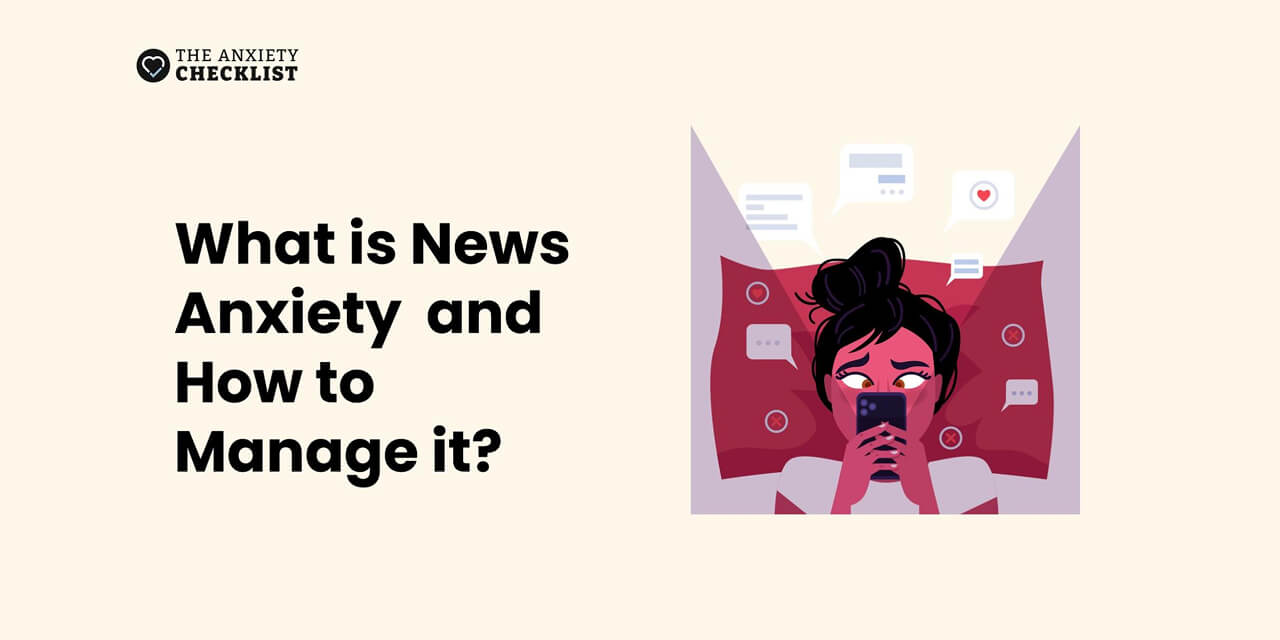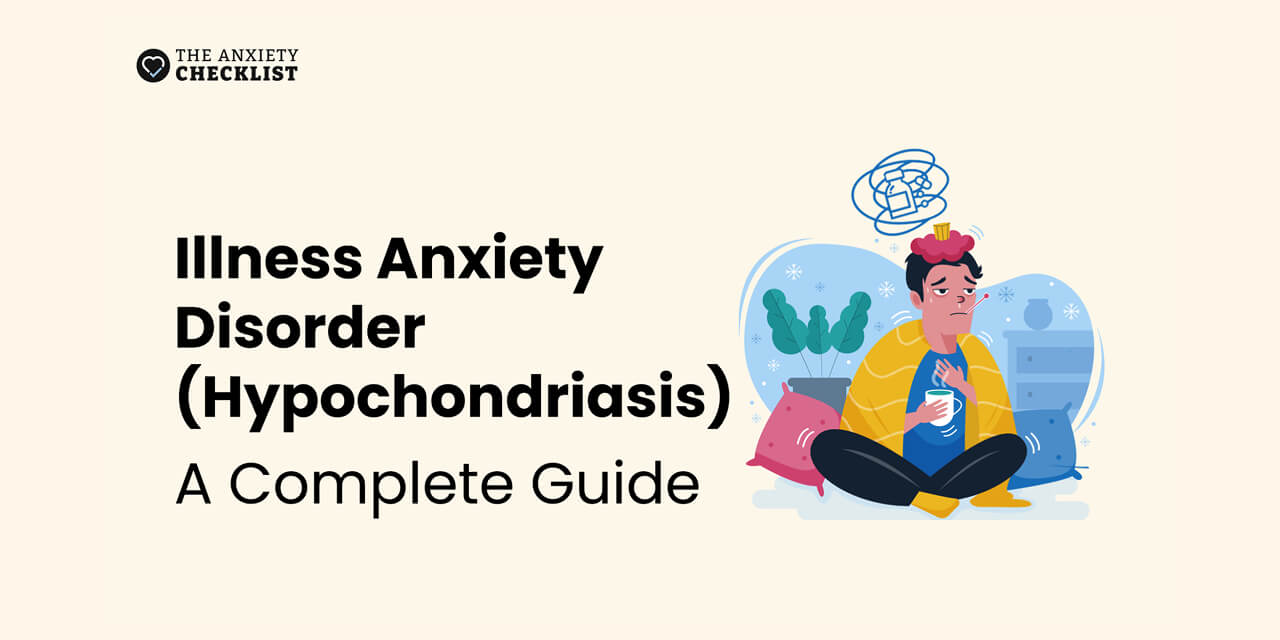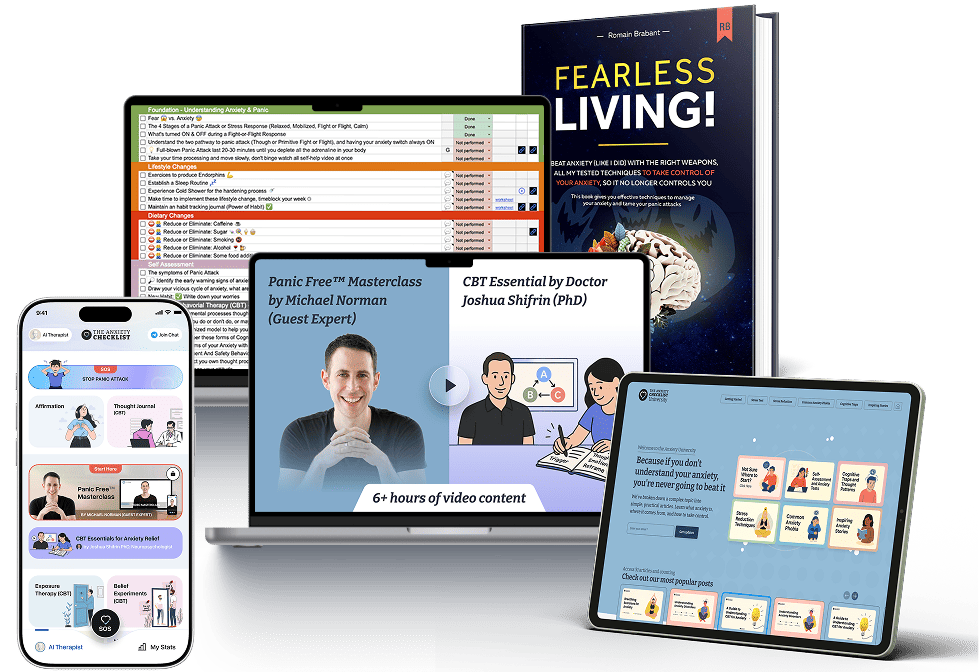When anxiety hits, do you know what to do next?
Learn how to calm your body, interrupt fear loops, and regain control step by step.
What Is News Anxiety?
News anxiety is the overwhelming worry, fear, or distress triggered by consuming too much negative or emotionally charged news.
It’s more than just feeling sad when reading a tragic story. It’s the buildup of stress, fear, and hopelessness from the nonstop stream of disasters, crises, and conflicts in the media.
In the US, 67% of people report feeling anxious about global events in 2025. It ranks highest among issues that cause anxiety among Americans:
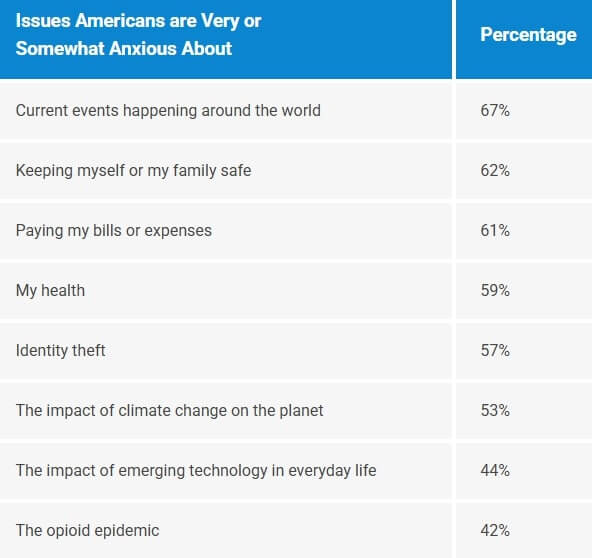
What Causes News Anxiety?
Even though some stress or negative thoughts from bad news is normal, news anxiety goes far beyond that. It's that nagging feeling that the world is a scary place and that bad things are always on the horizon.
Here are some of the main reasons why the news can trigger relentless anxious thoughts:
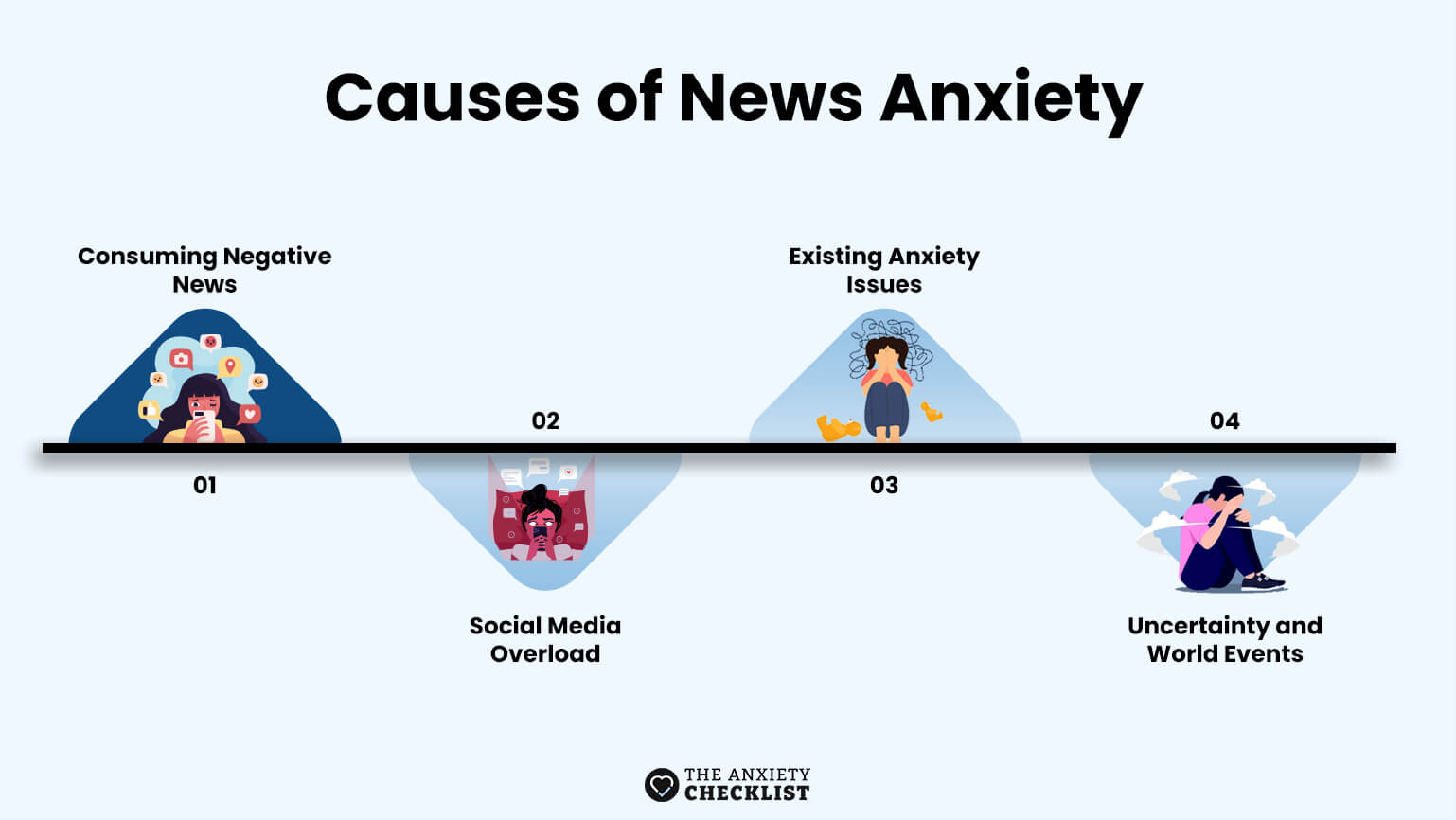
Overexposure to Negative News
Most news outlets focus on negative stories because they get the most attention. Bad news about disasters, violence, and scandals gets more views since our brains are wired to pay close attention to potential threats.
So, when the headlines report violence, disasters, or threats, your brain reacts as if you’re in danger, even when you're safe. The more you watch or read bad news, the more anxious and powerless you feel.
Social Media and Information Overload
Social media platforms like Instagram, Twitter, and TikTok have made it easy for us to access news and updates 24/7. Unfortunately, the constant stream of unfiltered information can be overwhelming and trigger anxiety.
One minute you’re watching a cute dog video, and the next you’re hit with graphic footage from a war zone. Even though some of the information may be false, it still leaves a negative impact on your emotions.
Pre-Existing Anxiety Disorders
If you have an existing anxiety disorder, depression, or phobia, negative information can trigger news anxiety. You might dwell on disturbing stories, overanalyze possible threats, or find it hard to stop overthinking about what might go wrong.
Even a single negative story can cause you to spiral into racing thoughts or panic, which makes it so important to learn how to manage your symptoms.
Uncertainty and Global Crises
World events like pandemics, political unrest, and economic problems create uncertainty since they’re not easily fixed. In 2024, 77% of people in the US stated that the future of the country was a major stressor, followed by economic issues and the presidential election, as shown below:
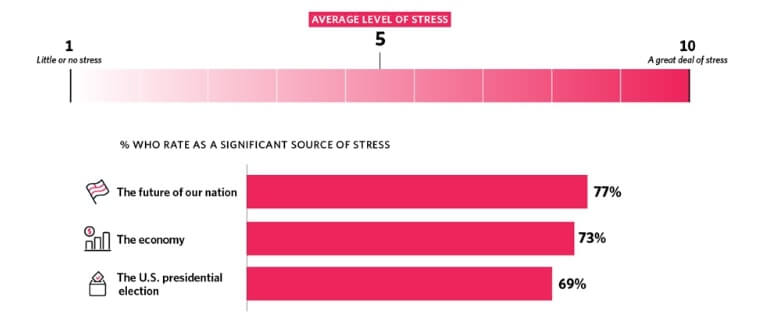
People want answers, solutions, or reassurance, but the news rarely provides this. So, when you repeatedly consume news revolving around these issues, you end up feeling helpless. And when you don’t know what’s coming next, news anxiety can occur.
Signs You May Have News Anxiety
It’s easy to overlook symptoms of news anxiety because it creeps in slowly and blends into your daily life. But if you pause and assess yourself, you might notice some telltale signs:
Here are some news anxiety symptoms to look out for:
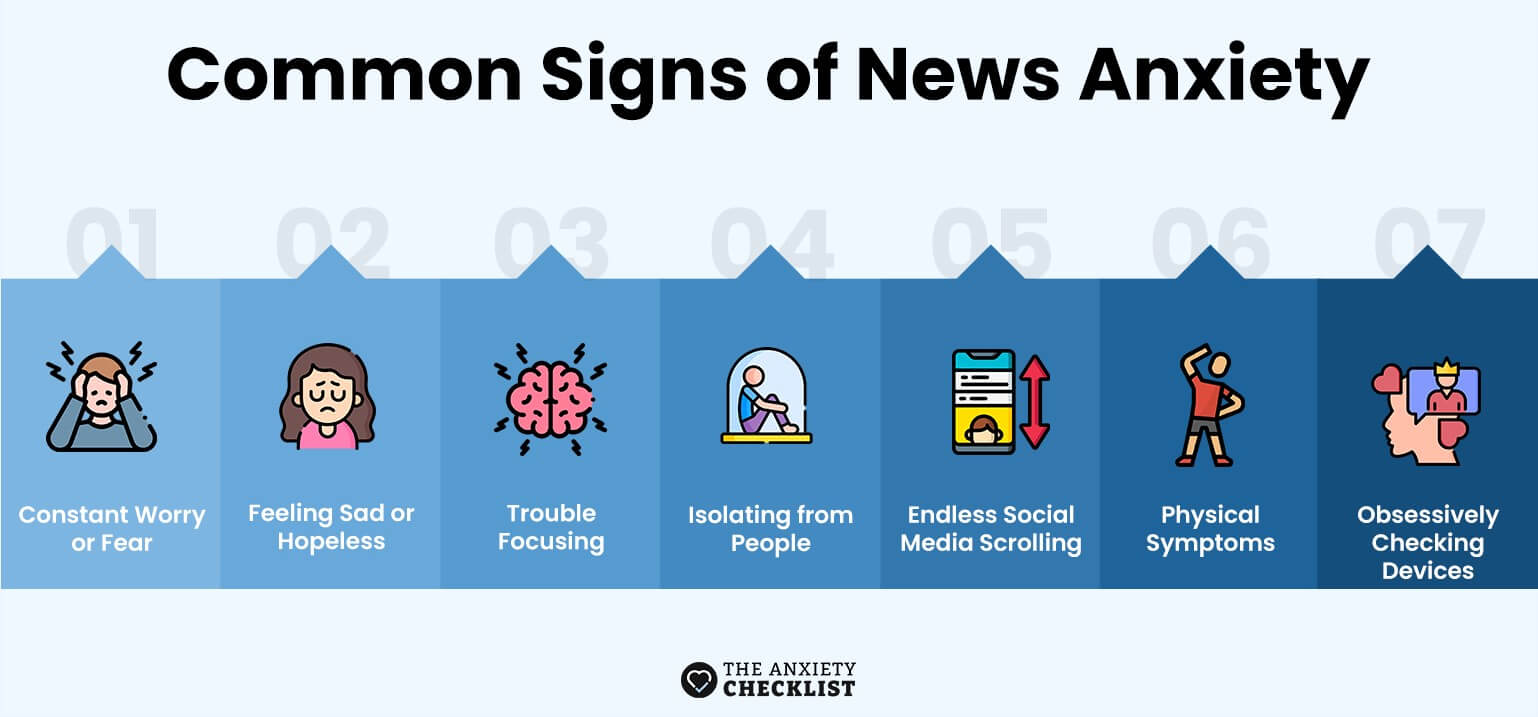
Increased Feelings of Worry, Fear, and Dread
If you constantly worry about your safety or the future after consuming news, it may be a sign of news anxiety. You may feel like something bad is always just around the corner, making it hard to relax. These feelings can stay with you long after you’ve closed the article or app.
Constantly Feeling Sad and Hopeless
Bad or distressing news can make you feel hopeless. You may start to believe that nothing will ever improve. If you feel a deep sense of sadness or hopelessness about the state of things, this could be a sign of news anxiety.
Difficulty Concentrating or Focusing
When your mind is full of worries from the news, it's hard to focus on other things. You might struggle to concentrate at work or on daily tasks without your mind drifting to something troubling you saw in the news. If you’re having trouble completing tasks, you may have news anxiety.
Withdrawing from Social Interactions
News anxiety makes you feel so hopeless or disconnected that you may start isolating yourself from friends and family. You may avoid socializing because you feel too drained or want to avoid certain conversations. Social isolation makes news anxiety worse over time, affecting your overall mental health.
Doomscrolling on Social Media Platforms
This is one of the major signs of news anxiety. By endlessly scrolling through negative news, you can worsen your symptoms. It becomes a compulsive habit that’s hard to break because your brain craves closure or a sense of control. You feel anxious, scroll for reassurance, and end up feeling even more nervous.
Physical Symptoms like Fatigue and Headaches
Mental stress from news anxiety can manifest in your body. You may experience chronic tension headaches, muscle tightness, stomach issues, fatigue, or even chest pain from constant overthinking and anxiety.
Frequently Checking Your Devices
Feeling the need to check your phone every few minutes for updates is a sign of news anxiety. It feels urgent, and you might even wake up in the middle of the night to check what’s happening. You tell yourself you want to stay informed, but it’s just a coping mechanism for the uncertainty you’re feeling.
How News Anxiety Affects Your Well-Being
If you don’t take steps to manage news anxiety, it can eventually take a toll on your mental, emotional, and physical health. Here are some ways news anxiety impacts your quality of life:
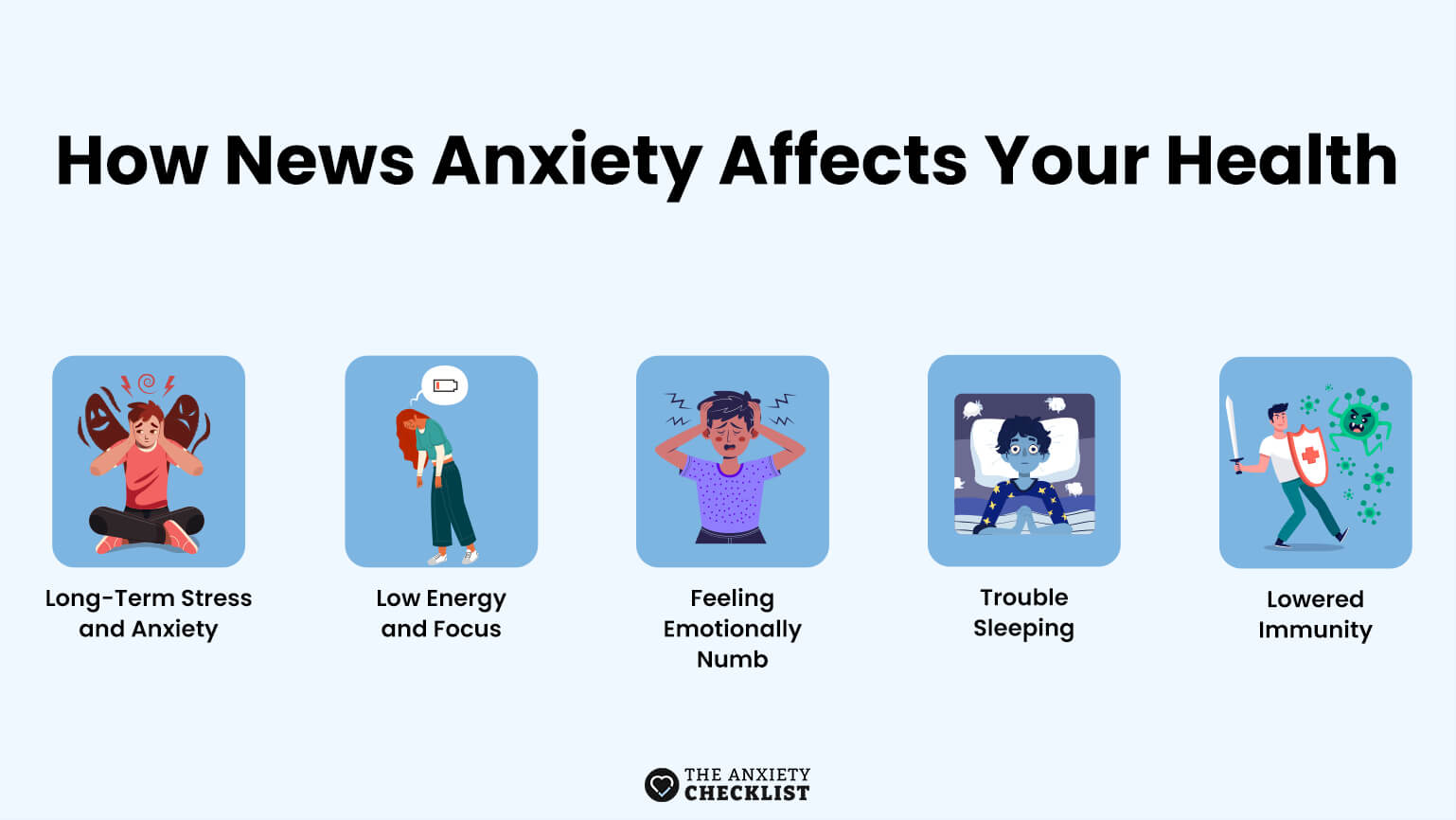
Chronic Stress and Anxiety Disorders
When you repeatedly read or watch bad news, your brain interprets everything as a threat. This triggers your body’s stress response, also known as the fight or flight response. Your heart rate goes up, your muscles tense, and stress hormones like cortisol flood your system.
Over time, that stress builds up and raises your risk for developing chronic anxiety disorders, panic disorders, and even depression.
Decreased Productivity
News anxiety can mess with your ability to focus. You may find yourself spending too much time on news sites or social media. This breaks your concentration, increases procrastination, and reduces your overall productivity.
Negative news consumption can also leave you feeling mentally drained even before the day begins. You may feel foggy, unmotivated, or constantly distracted.
Desensitization or Emotional Numbness
When you see disturbing images or headlines over and over, it can eventually make you feel numb. You might stop reacting emotionally, not because you don’t care, but because the news anxiety is too overwhelming.
This is called emotional desensitization. It’s your mind’s way of protecting itself, but it can make it difficult to feel empathy or connect with others. You may also struggle to respond to your own needs or healthily process your emotions.
Poor Sleep Quality
News anxiety can lead to insomnia, irregular sleep patterns, and restlessness. Consuming news, especially right before bed, can lead to cognitive distortions and anxious thoughts. And when your mind is racing, falling asleep or staying asleep becomes difficult.
This can cause you to feel exhausted during the day, which can affect your productivity and quality of life. In some cases, news anxiety builds up to the extent that you can have news-related nightmares.
Since sleep is essential for your physical and mental health, you may experience even more issues when you don’t get enough of it.
Weakened Immune System
Your physical and mental health are deeply intertwined. In fact, a recent survey revealed that 40% of adults with chronic pain suffer from anxiety and depression.
When your body is constantly in a state of fight or flight, it suppresses your immune system. As a result, you’re more likely to fall sick, take longer to heal, and feel physically worn down.
Chronic news anxiety leaves you vulnerable to:
Ways to Manage and Reduce News Anxiety
You don’t have to ignore the news entirely to cope with news anxiety. Instead, you can build healthy habits to stay informed without sacrificing your mental health.
Let’s look at some practical and proven strategies for managing and reducing news anxiety:
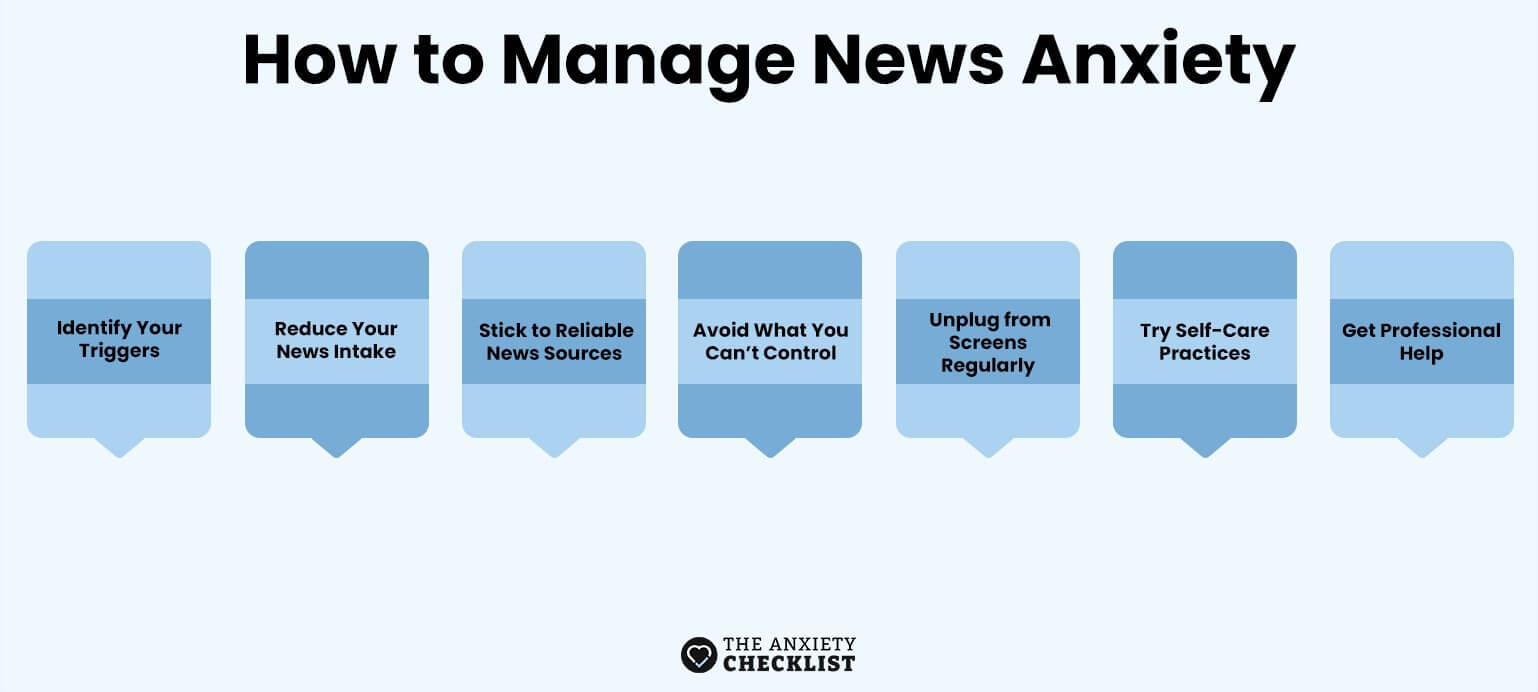
Know Your Triggers
Everyone reacts differently to news. What makes someone else feel informed might leave you feeling overwhelmed or upset. Understanding what type of news causes your anxiety helps you take proper steps to reduce its impact on your mental health.
Here’s how to identify your anxiety triggers:
Limit Your News Consumption
One of the most effective ways to manage news anxiety is by setting boundaries. Decide how much news you’ll consume daily and reinforce it.
Instead of checking the headlines every hour and scrolling endlessly, try the following:
Follow Credible News Sources
Choosing your news sources carefully can help you cope with news anxiety. Some news outlets focus on sensational headlines and clickbait stories, which can cause anxiety or worsen it.
Here’s how you can take control of your sources:
Avoid Dwelling on Events Beyond Your Control
It’s normal to feel upset about what’s happening in the world. But constantly thinking about things you can’t change doesn’t help. It only worsens your news anxiety and drains your mental energy.
Instead of replaying negative news in your mind over and over, follow these tips to recover from anxiety and protect your mental well-being:
Take Breaks from Screens and Social Media
Unplugging from your devices and social media accounts is one of the best ways to deal with news anxiety. It gives your mind a break from the constant stream of information and restores clarity and well-being.
Here’s how you can detox and manage news anxiety:
Practice Self-Care
When your mind feels cluttered with news anxiety, self-care can bring you back to the present and help you regain control of your thoughts. Practicing mindfulness and meditation calms your anxiety and soothes your mind.
Here's how you can manage news anxiety with simple self-care tactics:
Seek Professional Help
Sometimes, news anxiety becomes so severe that it starts interfering with your daily life. If your news anxiety is persistent, overwhelming, and causing distress, seeking professional help is the best option.
A psychiatrist or therapist can:
You don’t have to silently suffer from news anxiety. Seeking professional help is one of the most courageous steps you can take to protect your mental well-being.
Frequently Asked Questions
News anxiety is caused by:
Here are some proven coping mechanisms for news anxiety:
Final Thoughts
Previous Article
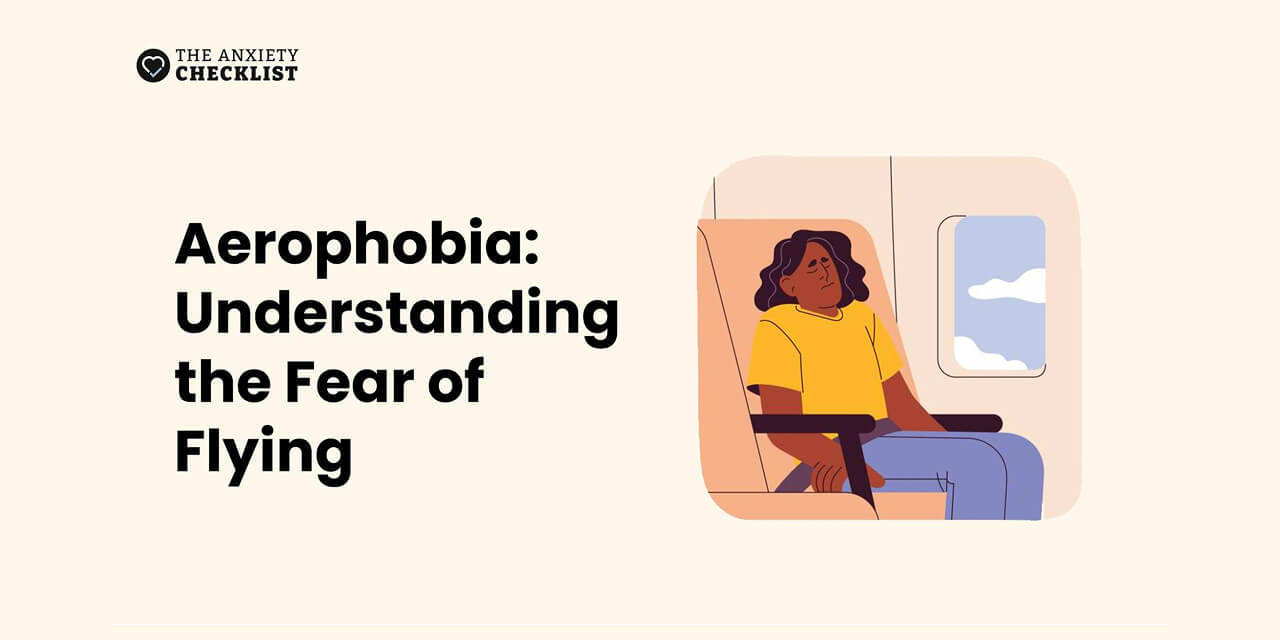
Aerophobia: Understanding the Fear of Flying
If you are in a crisis or any other person may be in danger - don't use this site. These resources can provide you with immediate help.



